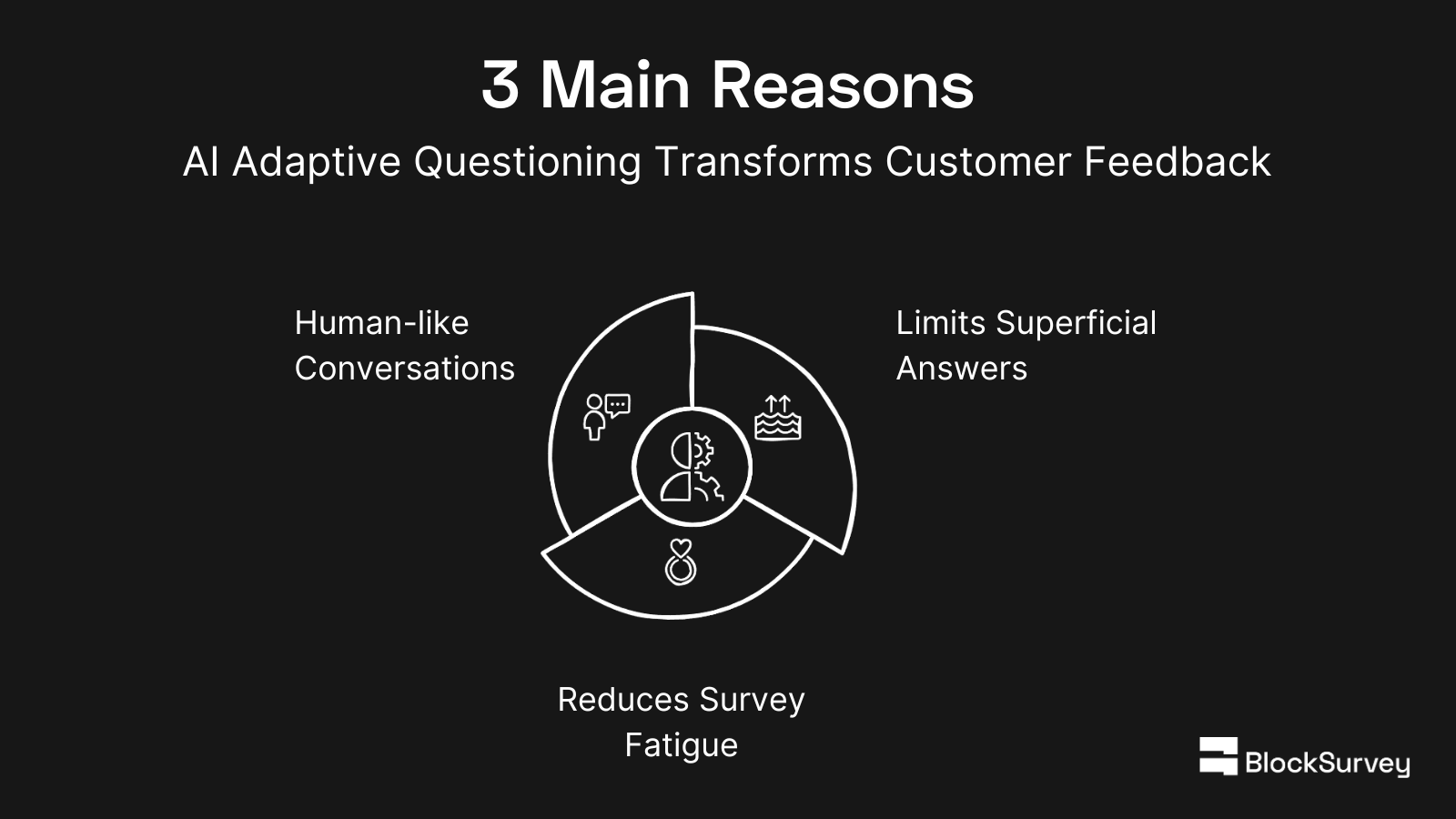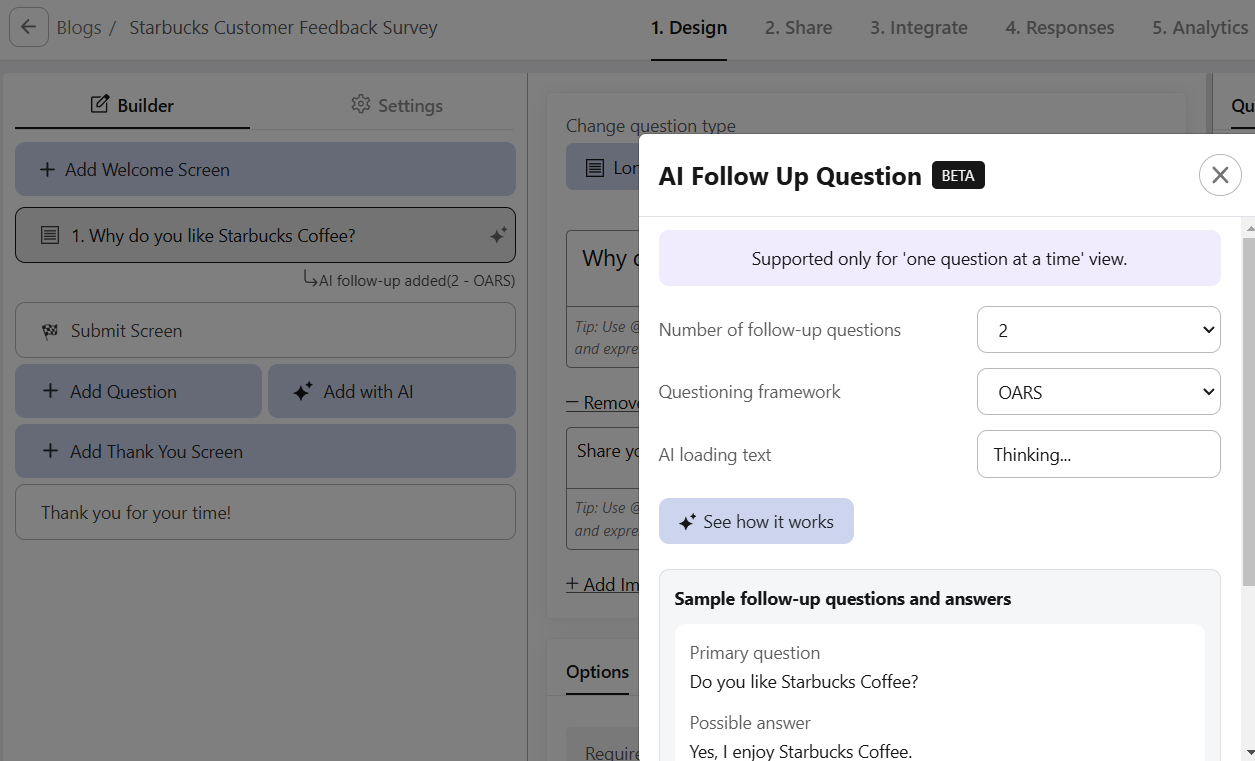Get insights.
Unlock value.
- 14-day free trial
- Set up in minutes
- No credit card required
Is Your Customer Feedback Falling Flat? Transform with AI Adaptive Questioning
The customer is the core stakeholder of your business. Knowing the customer feedback on your product or service helps make important decisions. Sometimes, you may struggle to get quality customer feedback. You may feel your customer feedback is falling flat. AI Adaptive Questioning can transform your customer feedback by bringing in more quality & depth.
In this blog, we’ll find out how AI adaptive questioning can enhance Starbucks customer feedback. Before that, let’s find out what AI adaptive questioning is.
What is AI adaptive questioning?
Asking only one question will not give you the insight you are looking for. That’s where AI adaptive questioning can be helpful.
Adaptive questioning or Dynamic questioning adapts to open-ended answers & probes the respondent with relevant follow-up questions to receive deeper insights.
Adaptive questioning is made possible with the help of Artificial intelligence, hence the name AI adaptive questioning.
By continuously probing the respondent with adaptive follow-up questions, one tends to get valuable insights that are instrumental in making the right decisions. The feedback quality is higher. AI adaptive questioning is highly flexible and can be used for any type of customer feedback.
Skip Logic feature should not be confused with AI adaptive questioning. Skip Logic is a programmed feature; Adaptive questioning is an AI-assisted feature.
How this AI Feature Transforms Customer Feedback?

Human-like Conversations
Not all responses are the same, so why should the follow-up be? AI adaptive questioning creates a human-like conversation that makes customers feel heard and understood while delivering insightful data. AI tailors follow-up questions based on each customer's answers in the feedback survey.
Limits Superficial Answers
Our AI identifies opportunities to probe deeper, prompting respondents with thoughtful follow-up questions that encourage fuller, more valuable insights—ensuring that the response is as comprehensive as possible. Say goodbye to receiving one-word answers and vague responses.
Reduces Survey Fatigue
Respondents are probed with follow-up questions only when configured, keeping the survey process streamlined. By minimizing unnecessary questions, you keep participants engaged and focused by reducing fatigue & enhancing the response rate.
Why Starbucks customer feedback can fall flat?
Consider we are running a customer feedback survey for the famous coffee retail “Starbucks.”
Shallow question
Here is an example of a shallow question.
“Do you like Starbucks coffee?”
This question just asks if the customer likes Starbucks coffee. This question is very shallow and does not ask for details. It does not ask the why behind liking the Starbucks coffee. Asking only a shallow question like this can thwart the purpose behind a customer feedback survey.
Irrelevant question
Here is an example of an irrelevant question.
“Which brand of smartphone do you use?”
In this case, why would anyone be interested in knowing what smartphone the customer uses in a coffee retail customer feedback survey? This is marked as an irrelevant question because it does not serve the purpose of the customer feedback survey.
Lengthy question
Here is an example of a lengthy question.
"How would you describe your overall experience at Starbucks, including the quality of the coffee and food, the behavior and efficiency of the staff, the cleanliness and comfort of the seating area, and the availability of your favorite menu items?"
If you are going to ask a lengthy question like this, the customer will find it overwhelming. As a result, you will receive low-quality feedback or sometimes no feedback at all. In this case, the question should be broken and asked one at a time.
To sum up, shallow questions, irrelevant questions, & lengthy questions can thwart the purpose of your customer feedback survey. Poor customer feedback can lead to low-quality & unactionable data.
How BlockSurvey’s AI adaptive questioning help Starbucks?
For our example, I have taken the question, “Why do you like Starbucks Coffee?”. Let’s see how BlockSurvey’s AI adaptive questioning feature helps Starbucks probing customers for deeper insights.
Configure Adaptive Questioning
By selecting the AI Follow-Up Question feature, you can choose the total number of follow-up questions for probing. The total number of follow-up questions can be anywhere from 1 to 5.
Also, select the questioning framework. BlockSurvey uses the OARS questioning framework, which means “Open Questions, Affirmations, Reflective Listening, and Summary Reflections.” It also plans to bring the 5 Whys questioning framework soon.
In the screenshot below, you can see the selection for 2 follow-up questions & OARS questioning framework.

How does Starbucks' customer feedback work now?
Take the survey below. You can see BlockSurvey’s AI adaptive questioning action in real-time. You can find how AI determines the appropriate question for probing open-ended answers.
This is how BlockSurvey’s AI adaptive questioning can enhance the Starbucks Customer Feedback Survey.
What’s next?
In conclusion, customer feedback is vital to understanding and improving your business, but the quality of feedback depends significantly on the questions you ask. Shallow, irrelevant, or lengthy questions can undermine the effectiveness of your surveys, resulting in poor data and missed opportunities.
AI adaptive questioning, powered by BlockSurvey, revolutionizes feedback collection by transforming static surveys into dynamic, human-like conversations. With its ability to probe deeper, limit superficial answers, and reduce survey fatigue, AI adaptive questioning ensures you collect actionable insights that truly reflect your customers' experiences and needs.
Elevate your feedback process and make informed decisions with BlockSurvey’s smarter, AI adaptive questioning.
Is Your Customer Feedback Falling Flat? Transform with AI Adaptive Questioning FAQ
Can AI adaptive questioning be used for surveys beyond customer feedback?
Yes, AI adaptive questioning can be utilized for various types of surveys beyond customer feedback. Its flexibility allows it to be applied in areas such as Market Research, Employee Engagement, Education & Healthcare.
Does AI adaptive questioning require technical expertise to set up and use?
While AI adaptive questioning uses sophisticated technology, platforms like BlockSurvey aim to make it user-friendly. However, understanding basic survey design principles and having some familiarity with AI concepts can enhance the effectiveness of using this feature.
How does BlockSurvey ensure data privacy and anonymity when using AI adaptive questioning?
BlockSurvey provides specific data privacy measures, such as data encryption, anonymization techniques, and compliance with relevant privacy regulations, to assure users that their sensitive information is protected.
What are the limitations of AI adaptive questioning?
While AI adaptive questioning offers many benefits, it's crucial to acknowledge potential limitations. These could include Bias in AI algorithms, & too much dependency on technology.
Get insights.
Unlock value.
- 14-day free trial
- Set up in minutes
- No credit card required


